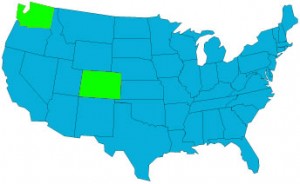 Colorado legislates legal cannabis rules,
Colorado legislates legal cannabis rules,
Washington hands task to Alcohol Board
By Jeremy Daw, JD, weedthepeoplebook.com
Since two states legalized adult cannabis sales and use last November, they have taken different approaches to the voter mandates. Colorado’s Amendment 64 Implementation Task Force, an appointed body of experts and bureaucrats, has released its final recommendations for how to treat cannabis businesses in the state’s new legal regime. By contrast, Washington State has outsourced much of its implementation of Initiative 502 to an outside group.
Colorado’s A-64, approved by a 55-45 margin by voters, placed a constitutional imperative on state bureaucrats to regulate so-called “recreational” cannabis in a manner similar to alcohol, but many of the specific regulations like tax rates and cultivation restrictions were left unaddressed by the voter-approved ballot initiative. The Task Force’s recommendations, which are preliminary and non-binding, are thus the first proposed rules for many specific situations.
Some proposed rules have already provoked controversy, such as the proposed prohibition of all outdoor cultivation sites under A-64 (the state’s medical marijuana program would not be affected by this rule, and it is unclear whether greenhouses would also be proscribed under it). Taxes, too, have become a point of contention. While A-64 approved taxes of up to 15% on adult sales of cannabis, the Task Force has recommended that state lawmakers return to voters for approval of new taxes, including an excise tax of 15% or higher on wholesale transactions and an additional retail tax on top of the state’s general sales tax. While the Task Force did not recommend any specific rate for the retail sales tax, it cited 25% as an exemplary figure.
Yet the Task Force’s endorsement of “cannabis tourism” – allowing out-of-state residents to consume cannabis within Colorado but not to traffic it out – may prove the group’s most controversial recommendation. While the proposal, especially in conjunction with high sales taxes, holds the promise of badly-needed revenues for the state, it also raises the specter of increased interstate trafficking to neighboring states where cannabis remains illegal.
By contrast, the state of Washington has turned to an outside consulting group for help in crafting its implementation of I-502. The consulting firm, Botec, is headed by UCLA public policy professor Mark Kleiman and includes Nobel-winning economist Thomas Schelling and CPA Luigi Zamarra, the architect of Harborside Health Center’s tax compliance strategy. While the group has yet to announce any specific recommendations, Kleiman wrote in his 2012 book Marijuana Legalization: What Everyone Needs to Know that he favors solutions such as small cooperatives or heavily regulated commerce over “commercialization on the alcohol model [which] would create an industry like the alcohol industry: a multibillion-dollar enterprise devoted to creating and sustaining as much addiction as possible.” However, other members of his team bring different approaches to the table and the Liquor Board structure will also affect the final design of the program. The missing element is what the federal government will do in response.
